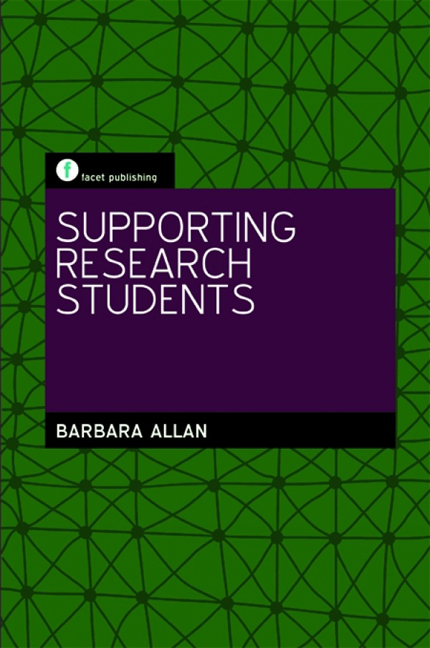Book contents
- Frontmatter
- Contents
- List of figures
- List of tables
- Acknowledgements
- 1 Introduction
- 2 Research and the research process
- 3 The research student's experience
- 4 Moving forward and completing the research
- 5 Research skills training
- 6 Supporting research students in academic libraries and information services
- 7 Virtual graduate schools
- 8 Introduction to research communities
- 9 Professional development
- Conclusion
- References and bibliography
- Index
8 - Introduction to research communities
Published online by Cambridge University Press: 09 June 2018
- Frontmatter
- Contents
- List of figures
- List of tables
- Acknowledgements
- 1 Introduction
- 2 Research and the research process
- 3 The research student's experience
- 4 Moving forward and completing the research
- 5 Research skills training
- 6 Supporting research students in academic libraries and information services
- 7 Virtual graduate schools
- 8 Introduction to research communities
- 9 Professional development
- Conclusion
- References and bibliography
- Index
Summary
Introduction
This chapter considers the importance of research communities in the context of supporting research students. The research process resulting in the publication of new knowledge was described in Chapters 1 and 2. As part of this process, academic researchers may be members of a number of different research communities, including communities based on specific research interests, those that come together around specific activities, e.g. publication of scholarly journals, and online communities. As part of their research development process, doctoral students have the opportunity to join different research communities. This is important because it provides them with access to up-to-date information and ideas, and enables them to network, and it may also have an impact on their future employment.
This chapter covers the following topics: introduction to communities, including communities of practice and communities of interest; research communities; information sharing in research communities; professional associations; academic conferences; online networking; and implications for library and information workers.
What are communities?
A body of people in the same locality; a group of people who have common interests, characteristics or culture.
(Chambers Dictionary, 2002)Membership of one or more research communities, involving either groups of academics and research students, or groups of academics, research students, practitioners and other stakeholders, offers doctoral students an opportunity to come together and share ideas and experiences, tackle professional and work-based problems and issues, and engage with their future professional communities. Research communities are often established to enable like-minded people or individuals with a common interest to work together and share ideas or develop new knowledge within a specific subject. Sometimes communities develop within or across organizations as the result of a particular organizational structure, e.g. a graduate school or postgraduate society or research centre. They may also develop as a result of the need to accelerate research in a particular subject or because of the interests and enthusiasm of a group of individuals who want to work together.
- Type
- Chapter
- Information
- Supporting Research Students , pp. 141 - 164Publisher: FacetPrint publication year: 2009



